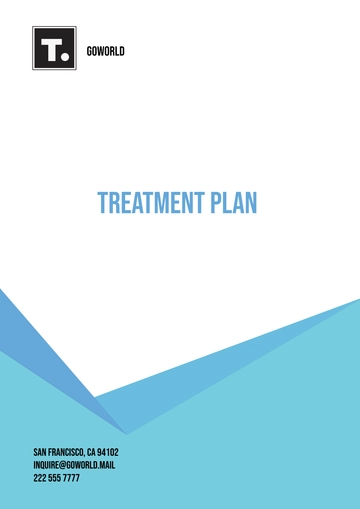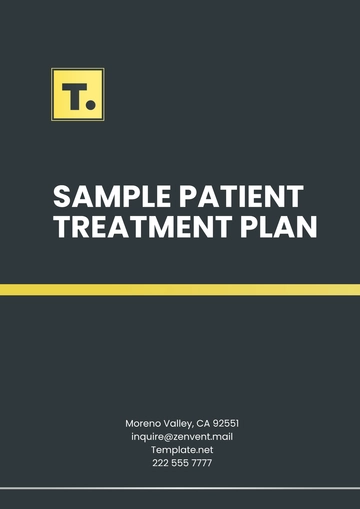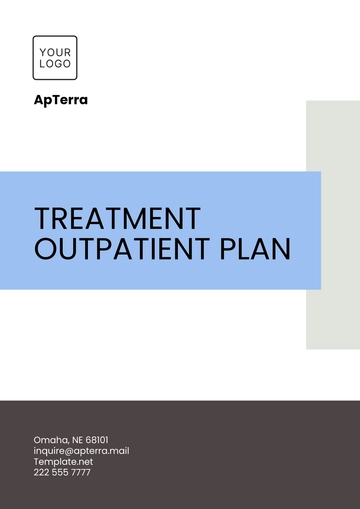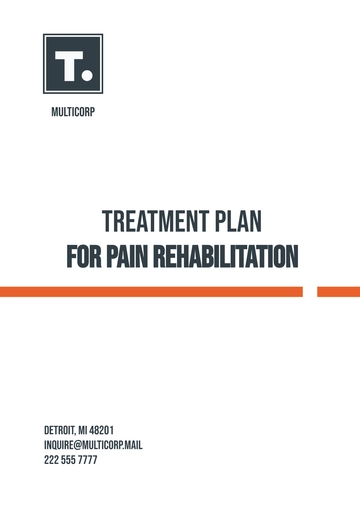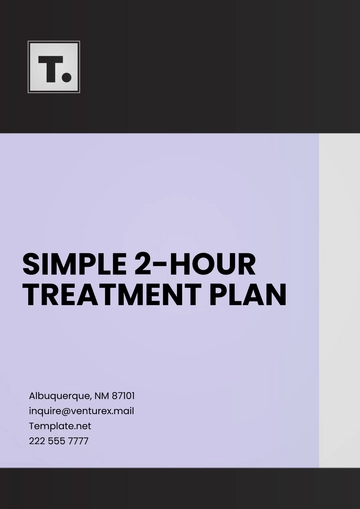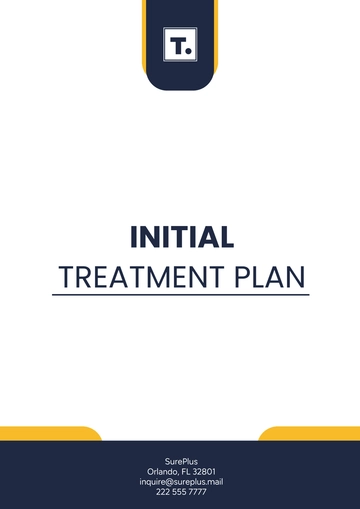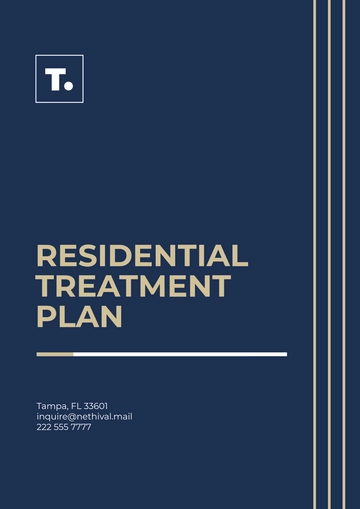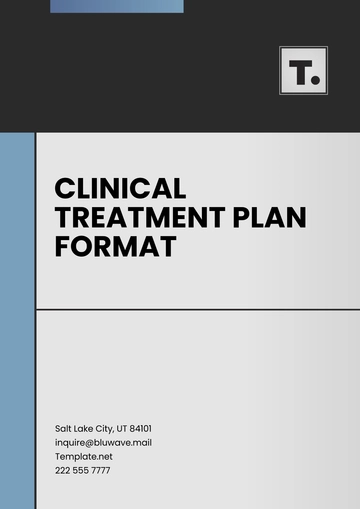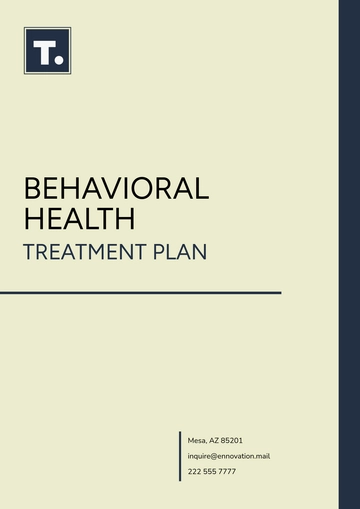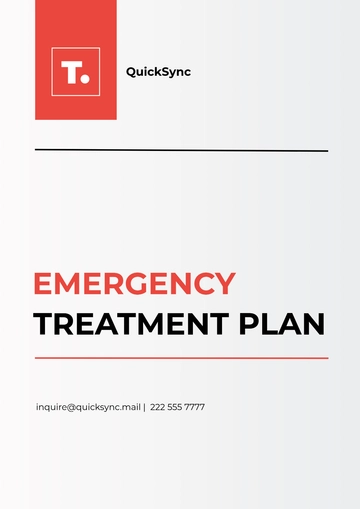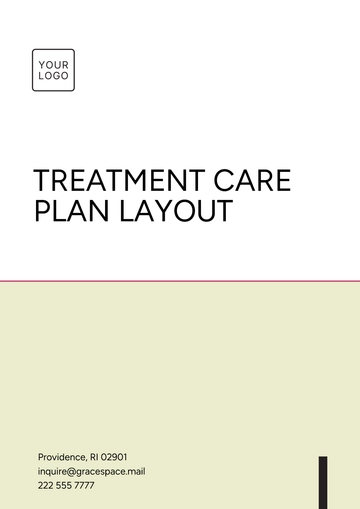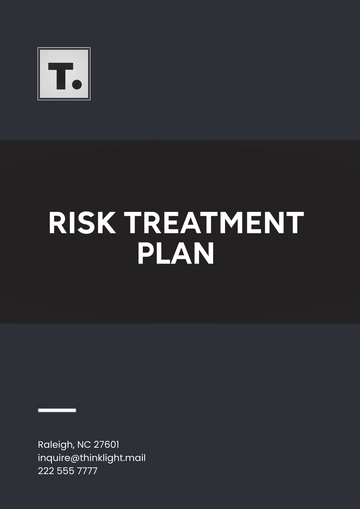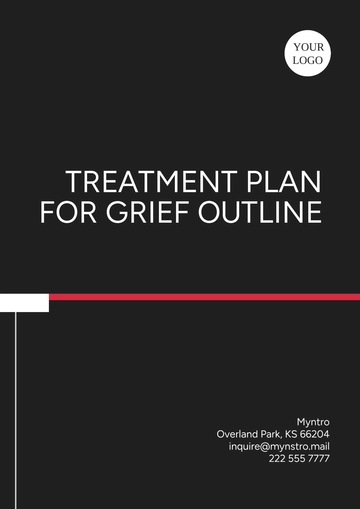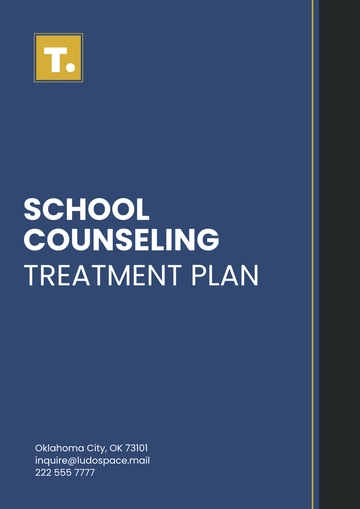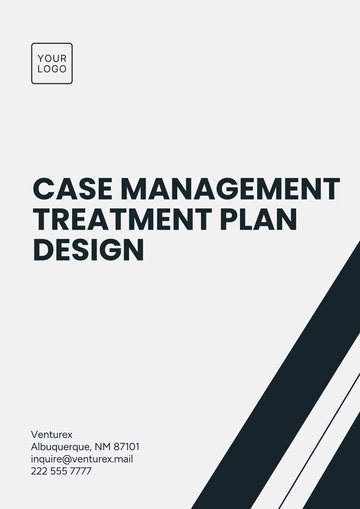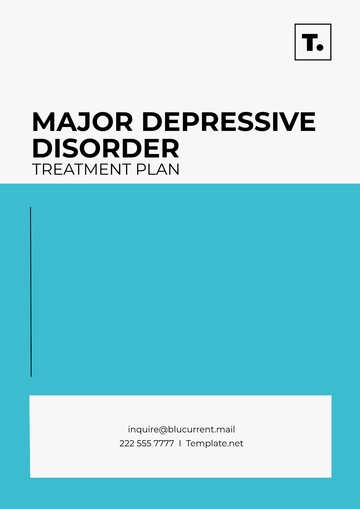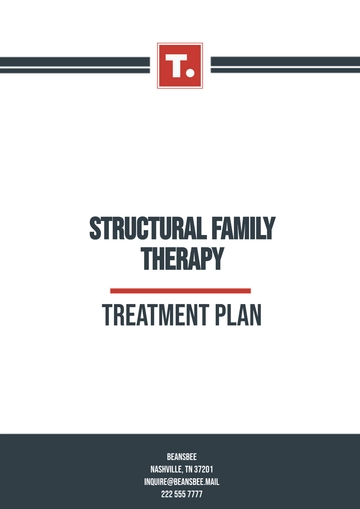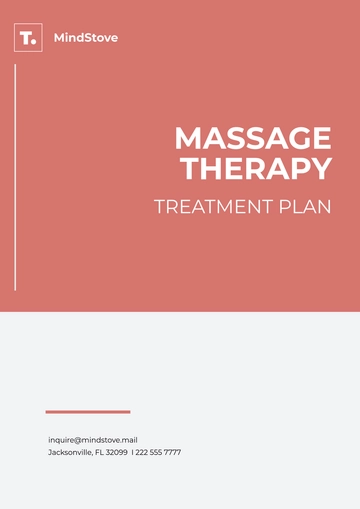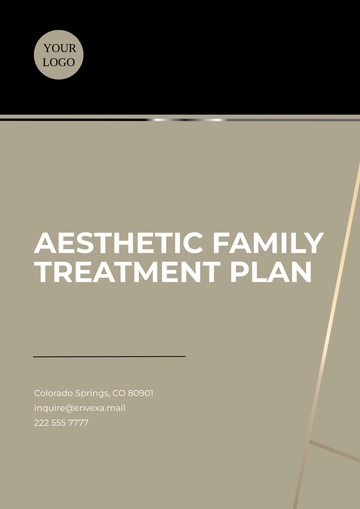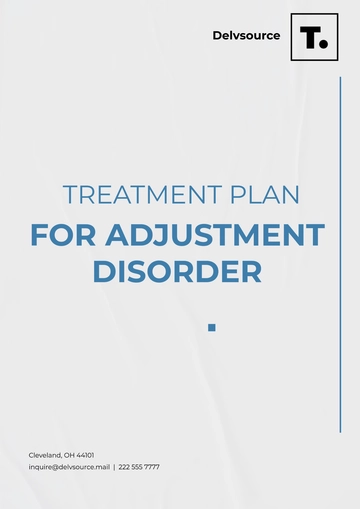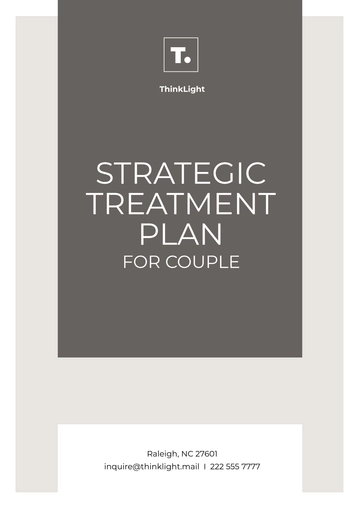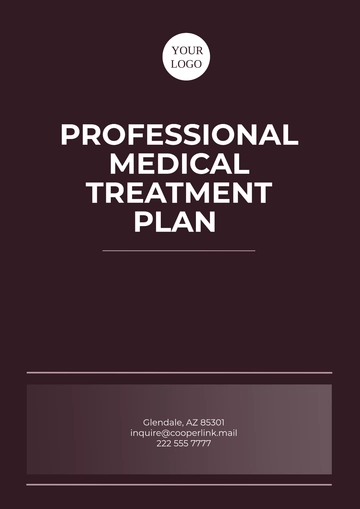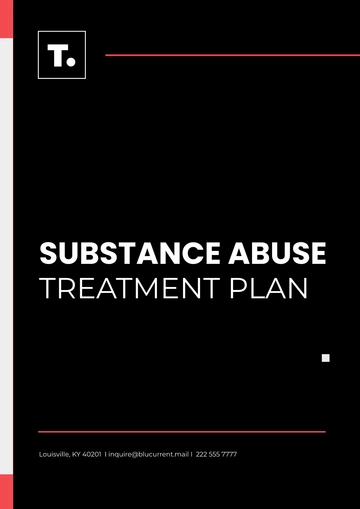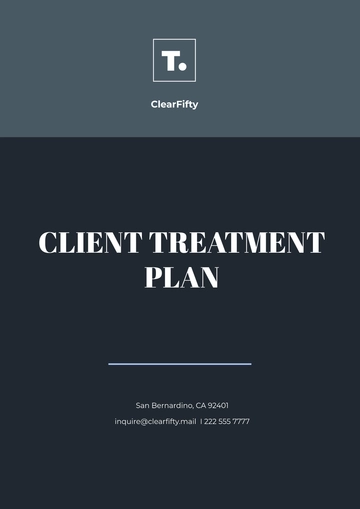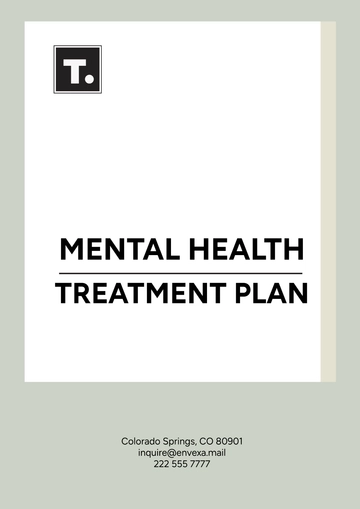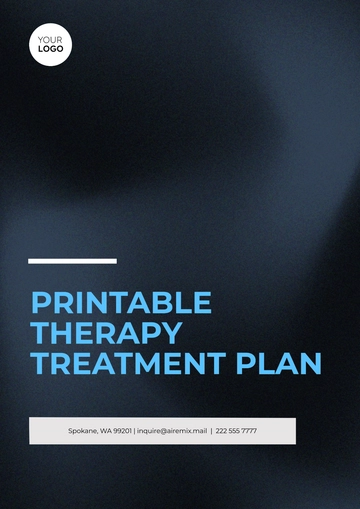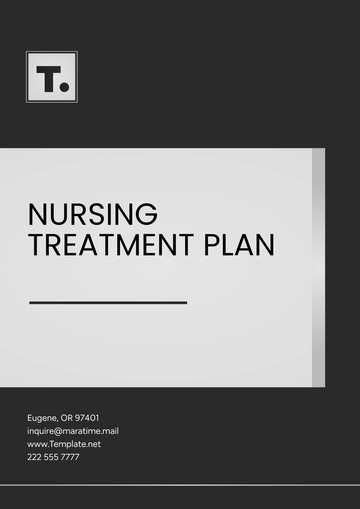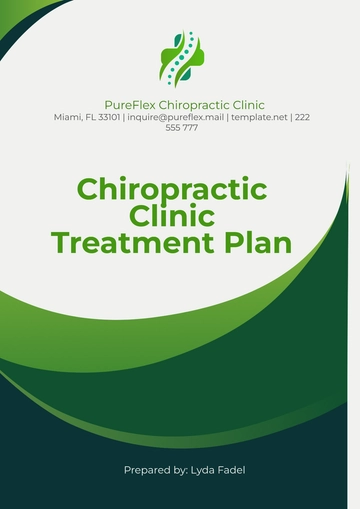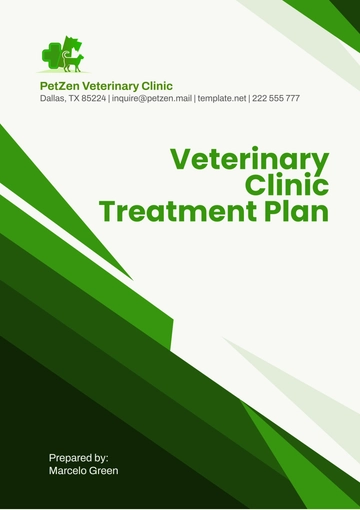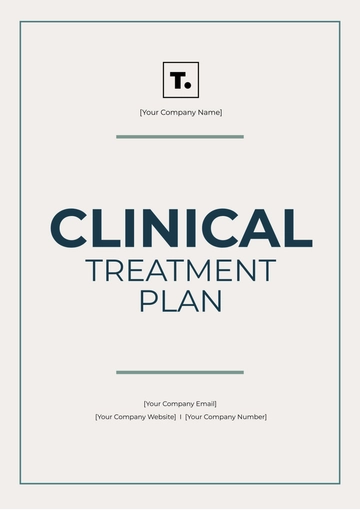Free Treatment Plan
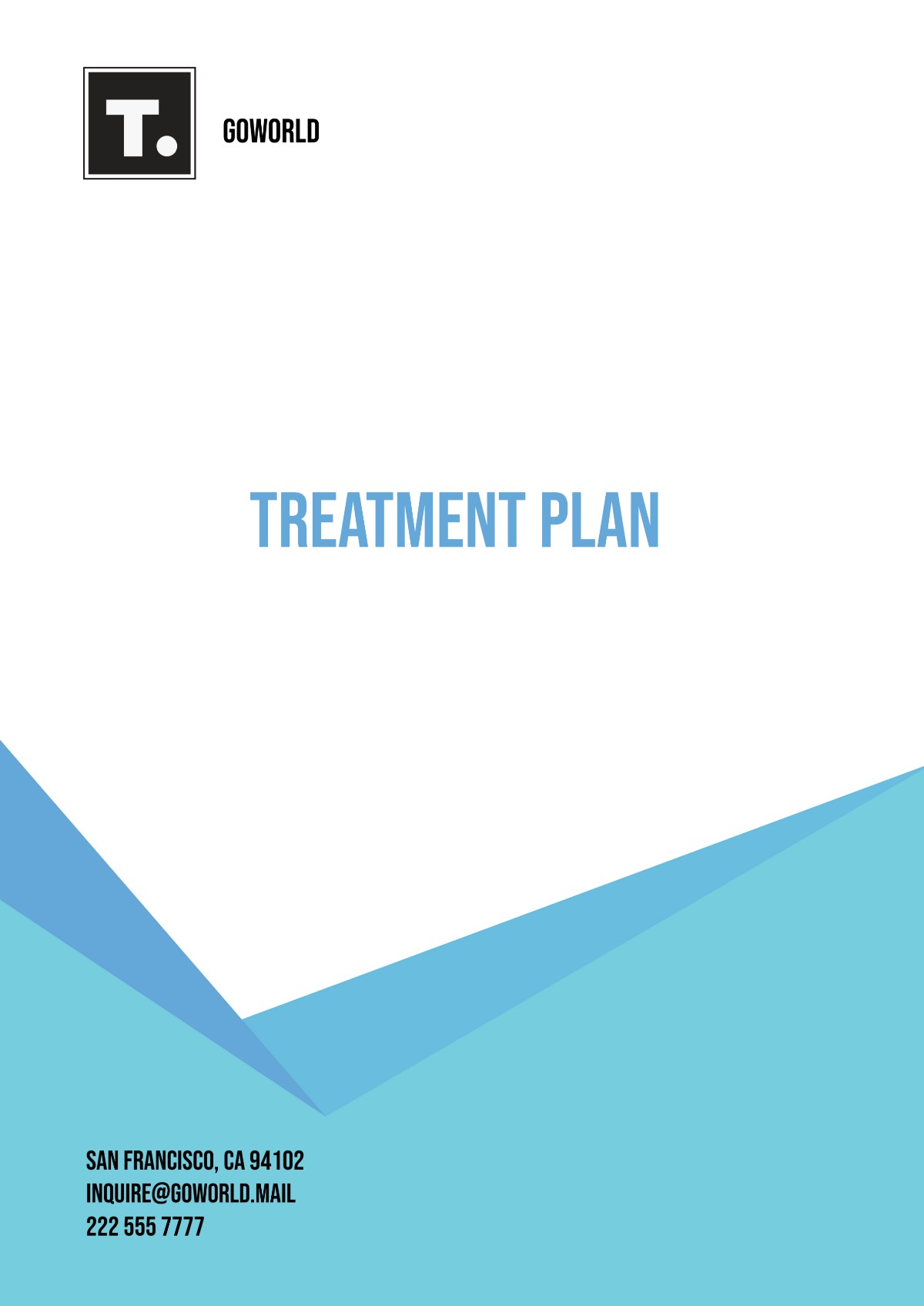
Prepared for: [CLIENT NAME]
Prepared by: [YOUR NAME]
Date: January 1, 2050
I. Introduction
This treatment plan details a comprehensive approach to addressing the challenges identified during the assessment phase. It includes clear objectives, evidence-based interventions, and a timeline to ensure measurable progress. The strategies are tailored to support the client's unique needs, fostering long-term well-being.
II. Objectives
The primary objectives of this treatment plan are:
To improve the client's mental and emotional well-being: By addressing underlying stressors and building resilience, clients will gain tools to manage their mental health effectively.
To develop effective coping strategies for stress and anxiety: Implementing practical techniques will help the client mitigate triggers and maintain a stable emotional state.
To enhance social and communication skills: Strengthening interpersonal abilities will enable the client to build and sustain meaningful relationships.
III. Assessment Summary
Based on the comprehensive assessment conducted on February 15, 2050, the following challenges were identified:
Persistent anxiety and stress-related symptoms, including racing thoughts, physical tension, and sleep disturbances.
Difficulties in social interactions and communication are marked by hesitance in group settings and struggles with active listening.
Challenges in maintaining a balanced work-life schedule, lead to feelings of burnout and diminished personal satisfaction.
IV. Treatment Plan
Goals | Interventions | Time Frame |
|---|---|---|
Reduce anxiety and stress | - Weekly Cognitive Behavioral Therapy (CBT) sessions to identify and reframe negative thought patterns. | |
- Daily Mindfulness Meditation exercises to enhance self-awareness and reduce physiological stress responses. | ||
- Monthly Stress Management Workshops to provide structured guidance on relaxation techniques. | 12 months | |
(January 2050 - December 2050) | ||
Improve social and communication skills | - Social Skills Training, including practice in nonverbal cues and assertive communication. | 10 months |
- Role-playing Exercises during biweekly sessions to simulate real-life social scenarios. | (February 2050 - November 2050) | |
- Participation in weekly Group Therapy Sessions to foster peer support and collaborative learning. | ||
Maintain work-life balance | - Time Management Coaching to prioritize tasks and set boundaries effectively. | 8 months |
- Interactive Workshops on Work-Life Balance focusing on practical strategies to integrate personal and professional commitments. | ||
- Setting Realistic Goals and Milestones to track progress and ensure accountability. | (March 2050 - October 2050) |
V. Anticipated Outcomes
Through the implementation of this treatment plan, the client is expected to achieve:
A significant reduction in anxiety and stress levels is evidenced by improved sleep quality, emotional stability, and a decreased reliance on avoidance behaviors.
Enhanced social skills and communication abilities, reflected in increased confidence during interactions and strengthened personal and professional relationships.
A sustainable work-life balance is demonstrated by the ability to fulfill professional responsibilities while maintaining personal well-being and leisure time.
VI. Follow-Up and Evaluation
To ensure the plan's effectiveness, regular follow-up sessions will be conducted. These will include:
Quarterly evaluations, starting on April 1, 2050, to measure progress using standardized tools, client feedback, and therapist observations.
Adjustments to interventions, based on the outcomes of follow-ups, to address any emerging challenges or refine existing strategies.
- 100% Customizable, free editor
- Access 1 Million+ Templates, photo’s & graphics
- Download or share as a template
- Click and replace photos, graphics, text, backgrounds
- Resize, crop, AI write & more
- Access advanced editor
Craft comprehensive treatment strategies effortlessly with Template.net's Treatment Plan Template. Editable in our Ai Editor Tool, this template streamlines the process, ensuring flexibility and efficiency. Customize it to suit individual needs and organizational requirements seamlessly, empowering professionals to devise tailored plans for clients with ease. Get this customizable template now!
You may also like
- Finance Plan
- Construction Plan
- Sales Plan
- Development Plan
- Career Plan
- Budget Plan
- HR Plan
- Education Plan
- Transition Plan
- Work Plan
- Training Plan
- Communication Plan
- Operation Plan
- Health And Safety Plan
- Strategy Plan
- Professional Development Plan
- Advertising Plan
- Risk Management Plan
- Restaurant Plan
- School Plan
- Nursing Home Patient Care Plan
- Nursing Care Plan
- Plan Event
- Startup Plan
- Social Media Plan
- Staffing Plan
- Annual Plan
- Content Plan
- Payment Plan
- Implementation Plan
- Hotel Plan
- Workout Plan
- Accounting Plan
- Campaign Plan
- Essay Plan
- 30 60 90 Day Plan
- Research Plan
- Recruitment Plan
- 90 Day Plan
- Quarterly Plan
- Emergency Plan
- 5 Year Plan
- Gym Plan
- Personal Plan
- IT and Software Plan
- Treatment Plan
- Real Estate Plan
- Law Firm Plan
- Healthcare Plan
- Improvement Plan
- Media Plan
- 5 Year Business Plan
- Learning Plan
- Marketing Campaign Plan
- Travel Agency Plan
- Cleaning Services Plan
- Interior Design Plan
- Performance Plan
- PR Plan
- Birth Plan
- Life Plan
- SEO Plan
- Disaster Recovery Plan
- Continuity Plan
- Launch Plan
- Legal Plan
- Behavior Plan
- Performance Improvement Plan
- Salon Plan
- Security Plan
- Security Management Plan
- Employee Development Plan
- Quality Plan
- Service Improvement Plan
- Growth Plan
- Incident Response Plan
- Basketball Plan
- Emergency Action Plan
- Product Launch Plan
- Spa Plan
- Employee Training Plan
- Data Analysis Plan
- Employee Action Plan
- Territory Plan
- Audit Plan
- Classroom Plan
- Activity Plan
- Parenting Plan
- Care Plan
- Project Execution Plan
- Exercise Plan
- Internship Plan
- Software Development Plan
- Continuous Improvement Plan
- Leave Plan
- 90 Day Sales Plan
- Advertising Agency Plan
- Employee Transition Plan
- Smart Action Plan
- Workplace Safety Plan
- Behavior Change Plan
- Contingency Plan
- Continuity of Operations Plan
- Health Plan
- Quality Control Plan
- Self Plan
- Sports Development Plan
- Change Management Plan
- Ecommerce Plan
- Personal Financial Plan
- Process Improvement Plan
- 30-60-90 Day Sales Plan
- Crisis Management Plan
- Engagement Plan
- Execution Plan
- Pandemic Plan
- Quality Assurance Plan
- Service Continuity Plan
- Agile Project Plan
- Fundraising Plan
- Job Transition Plan
- Asset Maintenance Plan
- Maintenance Plan
- Software Test Plan
- Staff Training and Development Plan
- 3 Year Plan
- Brand Activation Plan
- Release Plan
- Resource Plan
- Risk Mitigation Plan
- Teacher Plan
- 30 60 90 Day Plan for New Manager
- Food Safety Plan
- Food Truck Plan
- Hiring Plan
- Quality Management Plan
- Wellness Plan
- Behavior Intervention Plan
- Bonus Plan
- Investment Plan
- Maternity Leave Plan
- Pandemic Response Plan
- Succession Planning
- Coaching Plan
- Configuration Management Plan
- Remote Work Plan
- Self Care Plan
- Teaching Plan
- 100-Day Plan
- HACCP Plan
- Student Plan
- Sustainability Plan
- 30 60 90 Day Plan for Interview
- Access Plan
- Site Specific Safety Plan
